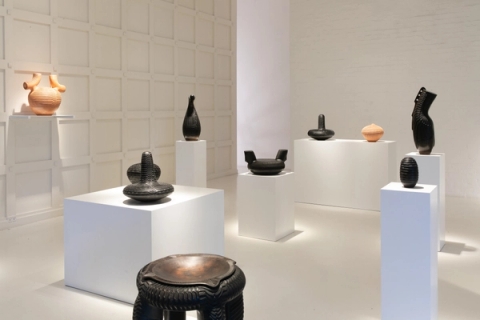My Enquiry (0)
No artwork has been selected.
Please choose an artwork to enquire.
Enquiry Submitted
Thank you for your enquiry and interest in our artists’ work. A member of the gallery team will respond shortly.
000%
6 June - 22 August 2024
“Justice is what love looks like in public, just like tenderness is what love feels like in private.” Dr. Cornell West
Southern Guild Cape Town is proud to present Madoda: Let Us Now Praise Famous Men, a solo exhibition by Cape Town-based ceramicist Madoda Fani. Inheriting its title from the artist’s given name (meaning ‘men’) and the acclaimed work of non-fiction by writer James Agee and photographer Walker Evans, this exhibition is a mapping of urban Black masculinities that challenges hetero-normative narratives of the township Black man in South Africa. Re-imagining ubiquitous domestic objects in clay, this body of work deconstructs reductive and harmful cliches of Black masculinities, re-fashioning them with masterful skill and attention to craft.
Challenging this fixity, Madoda: Let Us Now Praise Famous Men is a gesture of gratitude for and recognition of the Black men who shaped Fani. Using the township space as a topographical map of defiant tenderness, he eulogises the men he came from: his grandfather, a butcher, who sold sheep heads roasted over open fire; his father, a full-time steelworker and part-time artist, fashioning sculptures in the backyard of his home; ceramicist elders like Simon Masilo, the Nala family and Nic Sithole; his uncle, cousins and brothers, who through acts of softness and care created versions of masculinity informed by their environment and in spite of it. Fani puts this care into his painstakingly and delicately detailed work. Each carved line and indentation, an imprint of love. Hand-coiled, smoke-fired, meditative and rhythmic; the tenderness encased in a defensive and resilient exoskeleton.
Fani uses the primus stove as a central allegorical object to speak about Black manhood and vulnerability. A primus stove is a type of portable appliance that uses pressurised fuel to generate heat for cooking. Known for their durability and efficiency, these quickly become commonplace household items in lower income communities, solving issues of both space and power. Fani reconstitutes the object – softer and more fragile in clay than it is in its traditional steel, protected by spikes and scales, its defensive coat of armour.
Fani anatomises this fuel stove, breaking it into its smaller elements. He elongates the trivets, stretching them into a curved, open embrace. He turns them onto their sides, places them on their heads, displacing and renegotiating their function and finality. The pricker – a small, needle-like tool used to clean the jet nozzle of the portable cooker – is augmented, its needles stretched out of scale, its sharp ends slightly blunted.
In Gugulethu, young men and boys gather around these synthetic hearths, forming bonds of community that defy the historical intents of the township space. Created as ghettos, the township was constructed as an alternate geography of modernity, developed through a process of othering and designed as a space for the containment of Black people. This body of work recognises the ways in which manufactured tropes about the Black man and the ghetto are mobilised through violent stereotyping and the overdetermination of Black identity.
Madoda: Let Us Now Praise Famous Men by Madoda Fani runs concurrently with Like Something Almost Being Said by Adam Birch and Six Prayers by King Houndekpinkou.
Text by Lindokuhle Nkosi
Artist
Works
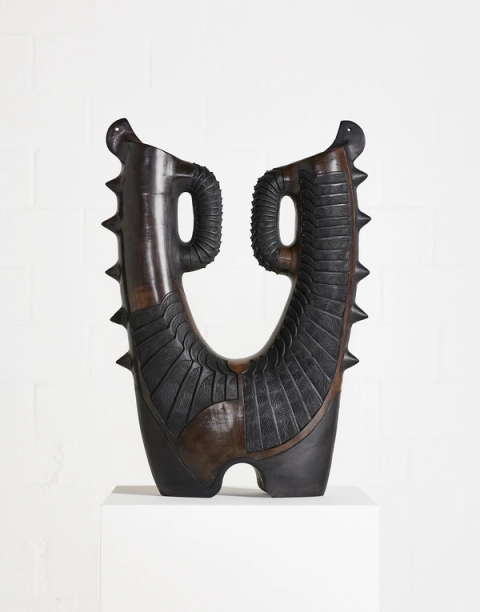
Madoda Fani
Imbewu, 2024Burnished, smoke-fired earthenware
31.9 x 23.3 x 8.3 in. | 81 x 59 x 21 cm
Sold
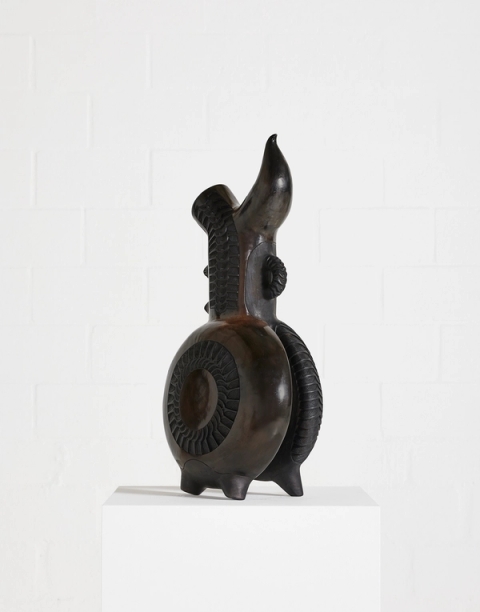
Madoda Fani
Masoka, 2024Burnished, smoke-fired earthenware
31.1 x 15.4 x 10.6 in. | 79 x 39 x 27 cm
Sold
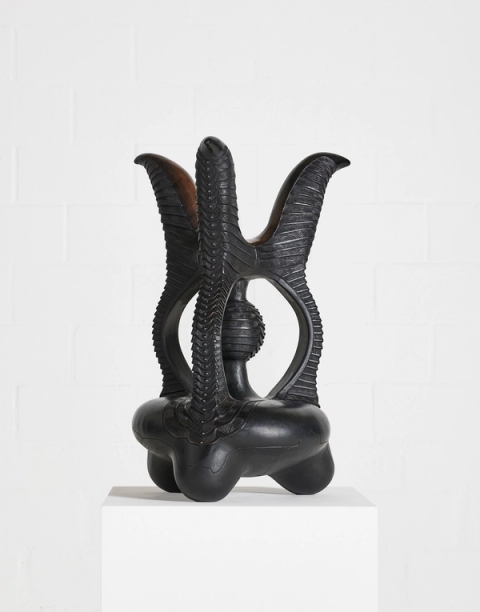
Madoda Fani
Primus Stove, 2024Burnished, smoke-fired earthenware
30.3 x 20.3 x 20.3 in. | 77 x 51.5 x 51.5 cm
Sold
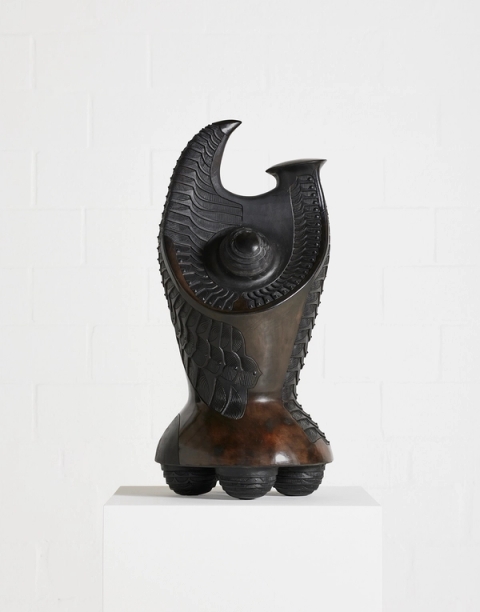
Madoda Fani
Mzwenkosi, 2024Burnished, smoke-fired earthenware
33.1 x 15.4 x 16.1 in. | 84 x 39 x 41 cm
Sold
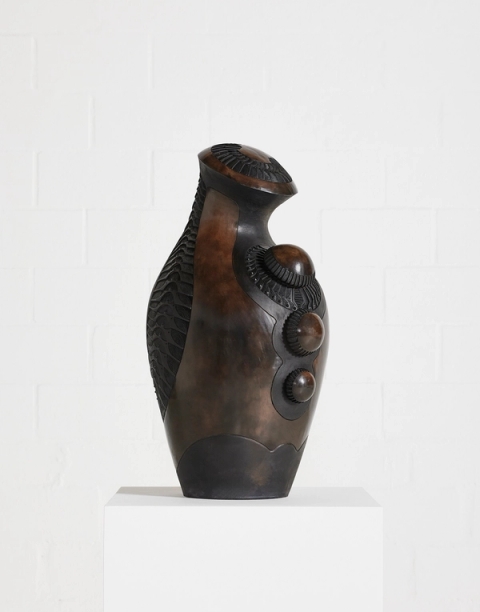
Madoda Fani
Gugulethu, 2024Burnished, smoke-fired earthenware
30.8 x 19.3 x 15.8 in. | 78 x 49 x 40 cm
Sold
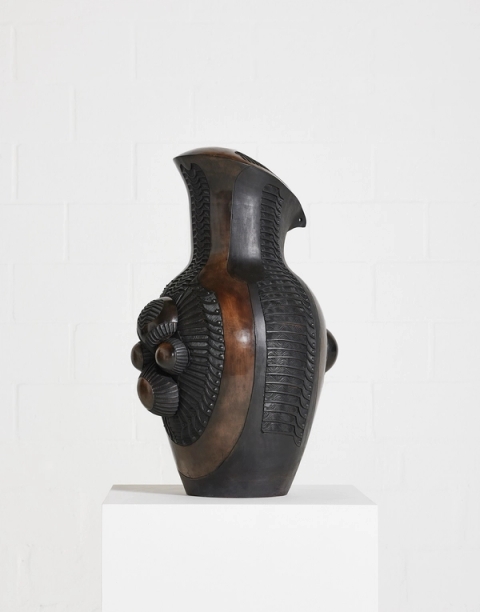
Madoda Fani
Gcobani, 2024Burnished, smoke-fired earthenware
30.3 x 20.5 x 15.8 in. | 77 x 52 x 40 cm
Sold
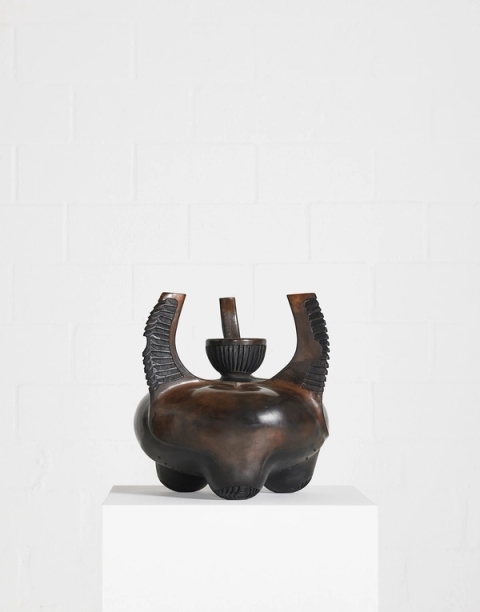
Madoda Fani
Unozala, 2024Burnished, smoke-fired earthenware
17.5 x 17.8 x 17.8 in. | 44.5 x 45 x 45 cm
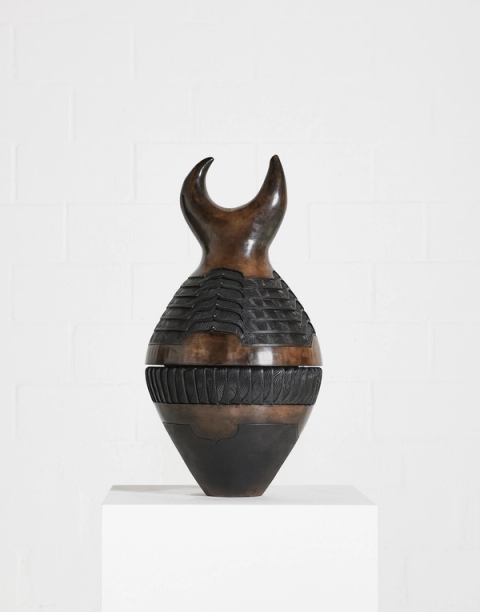
Madoda Fani
Zisina Zidedelana, 2024Burnished, smoke-fired earthenware
29.1 x 16.5 x 16.5 in. | 74 x 42 x 42 cm
Sold
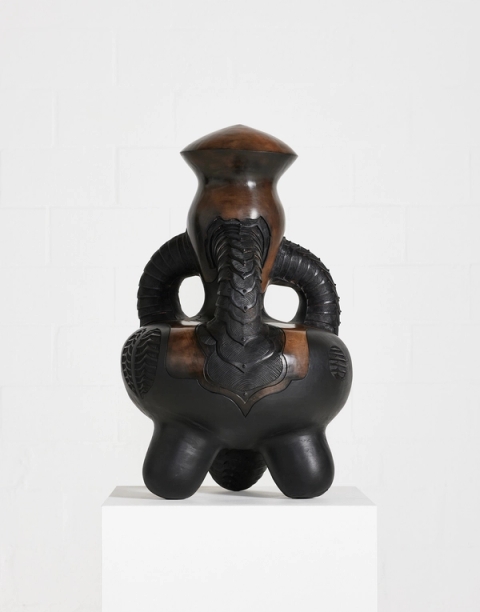
Madoda Fani
Cofimvaba, 2024Burnished, smoke-fired earthenware
31.9 x 20.1 x 20.1 in. | 81 x 51 x 51 cm
Sold



